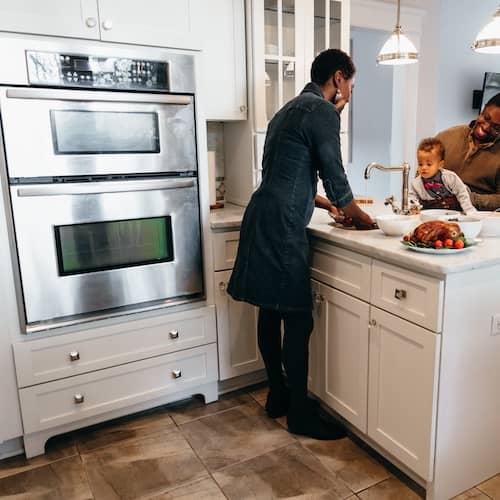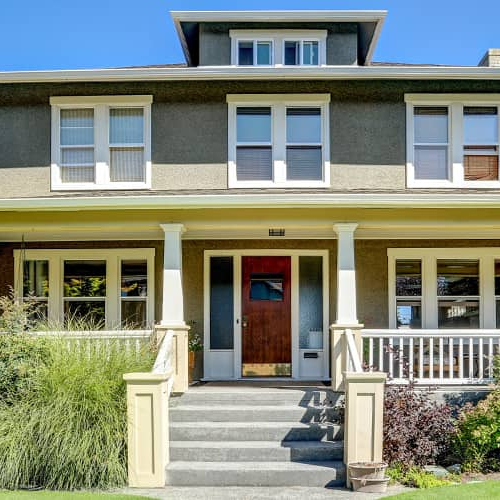How much income do I need for a $550K home?
Contributed by Tom McLean
Feb 4, 2026
•9-minute read

Important Legal Disclosure:
Any figures, interest rates, loan examples, and market data referenced in this article are hypothetical or aggregated for educational purposes only. They are not intended to reflect current pricing, available terms, or personalized loan options for any consumer. This content does not constitute an advertisement of credit terms, a solicitation or offer to extend credit, or a rate quote under federal or state lending laws. Actual mortgage rates and terms are determined by individual financial qualifications, property characteristics, market conditions, and other factors, and are subject to change without notice.
If you are seeking current, real-time mortgage rate information please refer to the official live rate information and product details published at rocketmortgage.com/rates, where current pricing and various loan terms are made available.
What salary does it take to afford a $550,000 home? That price is higher than the U.S. median home price, but the answer really depends on how much you can afford for a down payment, the mortgage rate your lender offers, how much debt you have, and the loan type you choose. We can show you a range of estimates for the income needed to qualify for a $550K mortgage and explain how you can decide whether you can afford a home at that price.
Quick answer: About $81,000 to $206,000 per year
Depending on how much you have saved for a down payment, plus your loan term and interest rate, you can buy a $550,000 home with a minimum income of about $81,000 to around $206,000, depending on your loan term, mortgage type, down payment, and interest rate.
This range is based on results from the Rocket Mortgage affordability calculator, using debt-to-income ratios (DTI) from 28% (considered comfortable) to 50%. This includes 15- and 30-year terms, down payments of 5% to 20%, estimated property taxes of $376, and estimated insurance premiums of $115 per month.1
Another rule of thumb is that you should spend no more than two to three times your annual household income, which would result in a range of $183,333 to $225,000 per year for a $550,000 home.
What factors determine how much home you can afford?
Income is only one factor that determines how much house you can afford, and whether you can buy a $550,000 home. Other factors include:
- Down payment. Different loan types have different minimum down payment requirements. Conventional loans require a 3% down payment2 for a fixed-rate loan and a 5% down payment for an adjustable-rate loan on a 1-unit home. VA loans3 and USDA loans have no down payment requirement.
- Mortgage insurance. If you buy a home with a conventional loan and put down less than 20% of the purchase price, you'll have to pay for Private mortgage insurance (PMI). Buyers who take out an FHA loan pay an up-front and annual mortgage insurance premium (MIP).
- Closing costs. These fees must be paid to fund your loan and transfer legal ownership of the property. Closing costs typically total 3% – 6% of the loan amount.
- Mortgage rates. The higher your interest rate, the higher your monthly payments will be.
- Credit score. Lenders typically have minimum credit score requirements and offer more competitive rates to borrowers with higher scores. Even though the specific credit score requirement for conforming conventional loans was recently dropped, lenders still will review your credit history.
- Homeowners insurance. Though not part of the principal and interest portion of your mortgage, a higher insurance policy will raise your housing costs overall. Factors that determine premiums include your location, policy options, and the age of the home.
- Property taxes. The amount you'll need to pay will vary by your location and your home's assessed value.
- Location. The location of the home can affect both the property price and the mortgage amount.
- HOA fees. If your home is part of a homeowners association, you'll pay HOA fees or dues. These costs typically cover the expenses required to maintain common areas and amenities offered.
- Maintenance and repairs. Even if you're not renovating your home, you'll still incur costs related to maintaining it, including minor repairs. A general rule of thumb is to set aside 1% to 4% of your home’s value annually for maintenance and repairs.
- Available assistance. Depending on where you live, whether you’re a first-time home buyer, and your financial profile, you may qualify for homebuyer assistance programs. Many offer to help cover the down payment or closing costs.
Consider using the Rocket Mortgage home affordability calculator to help you set a housing budget.
An income breakdown: What salary do I need to afford a $550,000 home?
Your individual financial situation will affect how much home you can afford. Some may also feel more comfortable stretching their budget to buy a home than others do.
To fully understand what income you need and what you are comfortable with, learn how to determine how much house you can afford. Also, consider exploring what your mortgage payments could be based on different scenarios, such as a higher down payment or a longer repayment term.
What percentage of my income should go to my mortgage?
Lenders use a metric called debt-to-income ratio to help them decide if you can afford a mortgage. DTI compares your monthly debt payments to your monthly gross income.
Specific loans have specific maximum DTI ratios, though there is usually some flexibility with the specific numbers.
One common rule of thumb is the 28/36 rule. This states that you should spend no more than 28% of your monthly gross income on housing expenses, which includes your mortgage principal, interest, taxes, homeowners insurance, and other fees such as HOA dues. This is called the front-end ratio. The second part of the rule is that no more than 36% of your gross monthly income should go to paying all your debts, including housing. This is the back-end ratio.
For example, a borrower with a household income of $162,000 has a gross monthly income of $13,500. The front-end ratio would be 28% of that amount, meaning you should spend no more than $3,780 on housing expenses. The back-end ratio would be 36% of that amount, meaning you should spend no more than $4,860 a month on all your debts, including housing.
$550,000 mortgage examples
Lenders have their own methods for the income requirements you will need to qualify for a mortgage.
In most cases, lenders will qualify you for a loan if your debt-to-income ratio is around 36%. In some cases, it can reach 45% for conventional loans. For government-backed mortgages like FHA loans, you may qualify with a higher DTI, such as up to 50%.
This table illustrates the target income, assuming you're purchasing a $550,000 home at a 7% rate over a 30-year term and paying an additional $1,500 in monthly debt.
Conventional loan |
|||||
|
Down payment percentage |
Monthly mortgage payment |
Income with 36% DTI |
Income with 43% DTI |
Income with 50% DTI |
Income with 57% DTI |
|
3% |
$3,549 |
$136,300 |
$117,042 |
$103,176 |
N/A |
|
5% |
$3,476 |
$133,867 |
$115,005 |
$101.424 |
N/A |
|
20% |
$3,294 |
$127,800 |
$109,926 |
$97,056 |
N/A |
FHA loan |
|||||
|
Down payment percentage |
Monthly mortgage payment |
Income with 36% DTI |
Income with 43% DTI |
Income with 50% DTI |
Income with 57% DTI |
|
3.5% |
$3,531 |
$135,700 |
$116,540 |
$102,744 |
$92,337 |
|
10% |
$3,660 |
$140,000 |
$120,140 |
$105,840 |
$95,053 |
This table shows target income and mortgage payment amounts based on a 7.5% rate.
Conventional Loan |
|||||
|
Down payment percentage |
Monthly mortgage payment |
Income with 36% DTI |
Income with 43% DTI |
Income with 50% DTI |
Income with 57% DTI |
|
3% |
$3,730 |
$142,333 |
$122,093 |
$107,520 |
N/A |
|
5% |
$3,653 |
$139,767 |
$119,944 |
$105,672 |
N/A |
|
20% |
$3,077 |
$120,567 |
$103,870 |
$91,848 |
N/A |
FHA Loan |
|||||
|
Down payment percentage |
Monthly mortgage payment |
Income with 36% DTI |
Income with 43% DTI |
Income with 50% DTI |
Income with 57% DTI |
|
3.5% |
$3,711 |
$141,700 |
$121,563 |
$107,064 |
$96,126 |
|
10% |
$3,461 |
$133,367 |
$114,586 |
$101,064 |
$90,863 |
Here, the target income and home loan payment are generally lower based on a 6% mortgage rate.
Conventional Loan |
|||||
|
Down payment percentage |
Monthly mortgage payment |
Income with 36% DTI |
Income with 43% DTI |
Income with 50% DTI |
Income with 57% DTI |
|
3% |
$3,199 |
$124,633 |
$107,274 |
$94,766 |
N/A |
|
5% |
$3,133 |
$122,433 |
$105,433 |
$93,192 |
N/A |
|
20% |
$2,638 |
$105,933 |
$91,619 |
$81,312 |
N/A |
FHA Loan |
|||||
|
Down payment percentage |
Monthly mortgage payment |
Income with 36% DTI |
Income with 43% DTI |
Income with 50% DTI |
Income with 57% DTI |
|
3.5% |
$3,182 |
$124,067 |
$106,800 |
$94,368 |
$84,989 |
|
10% |
$2,968 |
$116,933 |
$100,828 |
$89,232 |
$80,484 |
Here are some examples for buying a $550,000 home with a 15-year mortgage.
|
Loan term |
Down payment |
Mortgage rate |
Monthly payment* |
Income with 28% DTI |
Income with 43% DTI |
|
15 years |
5% |
5.625% |
$4,794 |
$205,457 |
$133,786 |
|
15 years |
10% |
5.625% |
$4,568 |
$195,771 |
$127,479 |
|
15 years |
20% |
5.625% |
$4,115 |
$176,357 |
$114,837 |
*Includes estimated taxes of $376 and insurance premiums of $115 per month
The above tables don't necessarily reflect other costs, such as homeowners insurance premiums, property taxes, and HOA fees. You'll also want to account for other expenses, such as home maintenance, to help determine how far your income can go to afford overall housing costs.
What down payment is required for a $550,000 house?
Your down payment can be as low as 3% with a fixed-rate conventional loan, but this will depend on the loan type and your lender's requirements. The amount of down payment you can afford will affect your monthly payment. The larger your down payment, the less you need to borrow to buy a $550,000 home, and the easier it is to qualify for a mortgage with less income.
Here's what you might expect to put as a down payment for a $550,000 home, depending on the type of loan you choose.
|
Loan type and buyer qualification |
Minimum down payment percentage |
Amount |
|
Conventional loan (primary residence) |
3% |
$16,500 |
|
FHA (580-plus credit score)4 |
3.5% |
$19,250 |
|
FHA (500 – 579 credit score) |
10% |
$55,000 |
|
VA |
0% |
$0 |
|
USDA |
0% |
$0 |
Remember, your down payment is only part of the cost of buying a home. You will also need to pay closing costs, which typically range from 3% – 6% of your loan amount.
You can use the down payment calculator from Rocket Mortgage to help determine how much cash you’d need to buy a $550,000 home.
Tips for buying a $550,000 home
Here are some best practices on how you can purchase a $550,000 home:
- Review your budget. Track your spending and create a realistic budget to determine how much you can realistically afford for housing expenses, including your $550,000 home.
- Improve your credit. The higher your credit score, the more likely you are to qualify for a lower interest rate. Take the time to identify what may be negatively affecting your credit score, and work to boost it if necessary.
- Reduce your existing debt. The lower your DTI, the better your chances of getting a mortgage approved.
- Save for your down payment. Even if you’re only saving 3%, the down payment for a $550,000 home could be significant. Consider taking steps to save now or exploring assistance programs.
- Get mortgage preapproval. Getting mortgage preapproval can show you how much mortgage you can afford. It's also helpful to show home sellers you have the financial means to purchase a home.
The bottom line: Affording a $550,000 home depends on more than just your income
Yes, you'll need a certain level of income to afford a $550,000 home. However, there are other requirements you'll also need to meet before a lender approves you for a loan, like your credit score and debt-to-income ratio. Look at your overall financial situation and assess your income to determine whether you can truly afford a $550,000 home.
If you’re ready to make the move to homeownership, start the application process with Rocket Mortgage today.
1 The Rocket Mortgage mortgage calculator is for estimation purposes only. Results do not reflect all loan programs and are subject to individual program loan limits. Qualification, rates and payments will vary based on timing and individual circumstances. This is not a commitment to lend.
Here’s a payment example based on an average home price and the most common loan type:
- Loan amount: $350,000
- Loan type: 30-Year Fixed
- Interest rate: 6.50% (6.78% APR)
- Monthly payment: $2,212.24
- Points: 1.875 points, costs due at closing $6,562.50
- Loan-to-value (LTV): 80.00%
One point is equal to one percent of your loan amount. Payment does not include taxes and insurance. The actual payment amount will be greater. Some state and county maximum loan amount restrictions may apply. Rates shown are valid on publication date of January 13, 2026.
If you didn’t enter taxes and insurance amounts, an estimate of your taxes is based on the state selected. This does not include all fees.
2The 3% down payment option is only available on certain conventional loan products and is not available in all states. Additional terms and conditions may apply.
3Rocket Mortgage is a VA-approved lender, not endorsed or sponsored by the Dept. of Veterans Affairs or any government agency.
4To qualify for this offer, you must meet all standard FHA eligibility requirements. In addition, your total mortgage payment, including taxes and insurance, cannot exceed 38% of your income, your debt-to-income (DTI) ratio cannot exceed 45%, and you must have 12 months of verifiable housing history immediately prior to your application, no late payments 30 days or greater in the last 12-months, and no derogatory marks on your credit report. Not available on jumbo loans. Asset statements may be needed, no more than 1 day of non-sufficient fund fees are allowed in the most recent 2 months prior to application. Additional restrictions/conditions may apply.
Rocket Mortgage is a trademark of Rocket Mortgage, LLC or its affiliates.

Sarah Li Cain
Sarah Li Cain is a freelance personal finance, credit and real estate writer who works with Fintech startups and Fortune 500 financial services companies to educate consumers through her writing. She’s also a candidate for the Accredited Financial Counselor designation and the host of Beyond The Dollar, where she and her guests have deep and honest conversations on how money affects our well-being.
Related resources
5-minute read
Down payment assistance programs and grants: What they are and how they work
Need help buying a home? Explore the different types of down payment assistance programs and grants available to you today.
Read more

10-minute read
How much house can you afford?
Ever asked, “How much house can I afford?” Determine how much you can spend on a mortgage with help from the Rocket Mortgage home affordability calc...
Read more

9-minute read
How to get a mortgage preapproval
Mortgage preapproval is an important step in your home-buying journey that helps you understand your borrowing ability. Find out what the process involves.
Read more